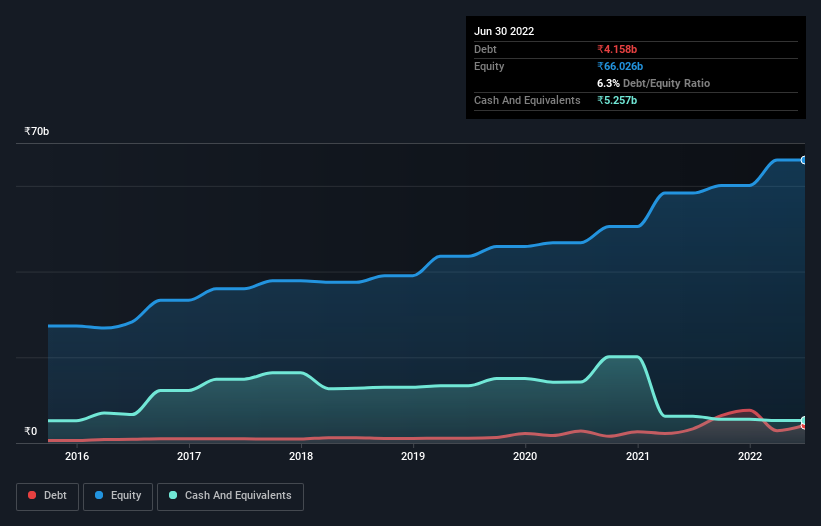Does Pidilite Industries (NSE:PIDILITIND) Have A Healthy Balance Sheet?

David Iben put it well when he said, 'Volatility is not a risk we care about. What we care about is avoiding the permanent loss of capital.' So it might be obvious that you need to consider debt, when you think about how risky any given stock is, because too much debt can sink a company. We note that Pidilite Industries Limited (NSE:PIDILITIND) does have debt on its balance sheet. But is this debt a concern to shareholders?
Why Does Debt Bring Risk?
Debt assists a business until the business has trouble paying it off, either with new capital or with free cash flow. Part and parcel of capitalism is the process of 'creative destruction' where failed businesses are mercilessly liquidated by their bankers. However, a more frequent (but still costly) occurrence is where a company must issue shares at bargain-basement prices, permanently diluting shareholders, just to shore up its balance sheet. By replacing dilution, though, debt can be an extremely good tool for businesses that need capital to invest in growth at high rates of return. The first step when considering a company's debt levels is to consider its cash and debt together.
View our latest analysis for Pidilite Industries
What Is Pidilite Industries's Debt?
The image below, which you can click on for greater detail, shows that at March 2022 Pidilite Industries had debt of ₹4.16b, up from ₹3.31b in one year. However, its balance sheet shows it holds ₹5.26b in cash, so it actually has ₹1.10b net cash.

How Healthy Is Pidilite Industries' Balance Sheet?
We can see from the most recent balance sheet that Pidilite Industries had liabilities of ₹23.3b falling due within a year, and liabilities of ₹5.88b due beyond that. Offsetting these obligations, it had cash of ₹5.26b as well as receivables valued at ₹15.3b due within 12 months. So its liabilities total ₹8.57b more than the combination of its cash and short-term receivables.
Having regard to Pidilite Industries' size, it seems that its liquid assets are well balanced with its total liabilities. So it's very unlikely that the ₹1.43t company is short on cash, but still worth keeping an eye on the balance sheet. While it does have liabilities worth noting, Pidilite Industries also has more cash than debt, so we're pretty confident it can manage its debt safely.
Fortunately, Pidilite Industries grew its EBIT by 3.2% in the last year, making that debt load look even more manageable. When analysing debt levels, the balance sheet is the obvious place to start. But it is future earnings, more than anything, that will determine Pidilite Industries's ability to maintain a healthy balance sheet going forward. So if you want to see what the professionals think, you might find this free report on analyst profit forecasts to be interesting.
But our final consideration is also important, because a company cannot pay debt with paper profits; it needs cold hard cash. While Pidilite Industries has net cash on its balance sheet, it's still worth taking a look at its ability to convert earnings before interest and tax (EBIT) to free cash flow, to help us understand how quickly it is building (or eroding) that cash balance. In the last three years, Pidilite Industries's free cash flow amounted to 46% of its EBIT, less than we'd expect. That weak cash conversion makes it more difficult to handle indebtedness.
Summing Up
While it is always sensible to look at a company's total liabilities, it is very reassuring that Pidilite Industries has ₹1.10b in net cash. And it also grew its EBIT by 3.2% over the last year. So we don't have any problem with Pidilite Industries's use of debt. The balance sheet is clearly the area to focus on when you are analysing debt. But ultimately, every company can contain risks that exist outside of the balance sheet. We've identified 1 warning sign with Pidilite Industries , and understanding them should be part of your investment process.
If you're interested in investing in businesses that can grow profits without the burden of debt, then check out this free list of growing businesses that have net cash on the balance sheet.
New: Manage All Your Stock Portfolios in One Place
We've created the ultimate portfolio companion for stock investors, and it's free.
• Connect an unlimited number of Portfolios and see your total in one currency
• Be alerted to new Warning Signs or Risks via email or mobile
• Track the Fair Value of your stocks
Have feedback on this article? Concerned about the content? Get in touch with us directly. Alternatively, email editorial-team (at) simplywallst.com.
This article by Simply Wall St is general in nature. We provide commentary based on historical data and analyst forecasts only using an unbiased methodology and our articles are not intended to be financial advice. It does not constitute a recommendation to buy or sell any stock, and does not take account of your objectives, or your financial situation. We aim to bring you long-term focused analysis driven by fundamental data. Note that our analysis may not factor in the latest price-sensitive company announcements or qualitative material. Simply Wall St has no position in any stocks mentioned.
About NSEI:PIDILITIND
Pidilite Industries
Engages in the manufacture and sale of consumer and specialty chemicals in India and internationally.
Outstanding track record with flawless balance sheet and pays a dividend.


